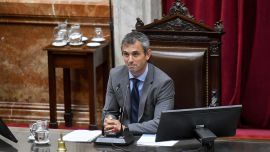President Luiz Inácio Lula da Silva promised to bring prosperity back — “barbecue and beer” for all — if he returned to Brazil’s top job. Two months into his presidency, the economy he inherited is cutting his honeymoon short and has him rushing to stem the damage.
Official data released Thursday showed Brazil’s gross domestic product shrank 0.2 percent at the end of 2022, snapping five straight quarters of growth. The downturn is widely expected to continue this year.
If analysts’ forecasts hold true, Lula’s ambitious plans to fight both hunger and the deep political divide in Latin America’s largest nation are under threat. He won the election evoking nostalgia for the boom times of his previous two terms when poverty fell and Brazil rose to the centre of the world stage.
His pitch: “People need to be able to barbecue again.”
But since taking office on January 1, Lula appears to be struggling to reconcile with the tough economic reality. He’s clashed with investors and his own Central Bank chief, whipsawing markets and budget hawks who fret about high debt levels and limited space for more spending.
“The fact is, Lula is really worried about a recession,” said Thomas Traumann, a columnist and political consultant. “He’s hitting every button he has available, but realises there’s not much he can do.”
Pummelled demand
For full-year 2022, Brazil posted 2.9 percent growth largely on services as Covid-19 restrictions were lifted, and on gains in industry, according to the national statistics institute. On the other hand, agriculture lost productivity.
Now, tight financial conditions and above-target inflation are pummelling demand. At the same, the effects of a multi-billion dollar stimulus introduced last year by former President Jair Bolsonaro are fading, while the global economy seems set to slump.
The upshot is analysts see gross domestic product expanding less than 1% in 2023. While that could change, most agree the risks are rising.
“High interest rates are taking a toll on Brazil’s economy and put the growth outlook for the first year of President Luiz Inácio Lula da Silva’s term on weak footing. Instead of quarrelling with the Central Bank, Lula could foster growth by clarifying his economic policies and overhauling consumption taxes to boost productivity," said Adriana Dupita, Bloomberg's Brazil and Argentina economist.
Truth is, Lula had nothing to do with Thursday’s data. The economy was initially hit by the pandemic and then propped up temporarily by tax cuts and handouts given by his predecessor ahead of last year’s election.
Still, it’s now a far different country than the one Lula led from 2003 to 2010. Back then, he oversaw a commodity bonanza that fuelled growth and welfare programmes that pulled millions of Brazilians into the ranks of the middle class.
And after beating Bolsonaro, a conservative former army captain, by one of the slimmest margins in Brazil’s modern history — a victory that his opponent still hasn’t formally recognised — the 77-year-old president is hard-pressed to show supporters he’s serious about bringing the nation back to its former glory.
Concerns about what four more years of Bolsonaro would have meant for Brazil’s young democracy united both allies and one-time Lula critics. Though, “to many voters, Lula is ‘barbecue and beer,’” Traumann said. “It’s the feel-good factor.”
The pressure on Lula to deliver was heightened just days into his new administration when thousands of Bolsonaro backers rioted in the capital, Brasília, ransacking some of the nation’s most sacred democratic institutions and alleging electoral fraud. The mobs were quickly quashed, but staunch opposition remains.
Measures
Lula has pursued measures to soften the blow from inflation and give the economy a jolt. Chief among them was securing approval to lift spending by some US$32 billion this year, mostly for aid to the poor.
The leftist leader is pledging to introduce a new fiscal framework in coming weeks. But with the government expected to run a primary deficit this year, investors are anxiously asking how and when?
“This uncertainty is the problem,” said Tatiana Pinheiro, chief economist at Galapagos Capital, as asset manager in São Paulo. “This year everything depends on the fiscal side.”
For its part, the Central Bank is warning it will keep the key interest rate at a six-year high of 13.75 percent to tamp down rising inflation expectations — and making the economy run cooler for longer. The stance has led Lula to unload his frustrations on the bank’s chief, Roberto Campos Neto, slamming him for monetary policy that he says is too restrictive.
The spat hasn’t helped: traders are paring back bets on rate cuts this year. Though, it may allow Lula to share the blame if the economic slide continues.
“Lula understands he needs to first demonstrate how messed up the house was when he arrived,” said Thiago de Aragão, head of strategy at Arko Advice, a consulting firm. “And second, prepare his followers and supporters for an environment where he won’t be able to make miracles.”
related news
by Andrew Rosati, Bloomberg



















Comments